#suicide prevention and awareness
Text
As Suicide prevention month continues, this is a great time for flight attendants to have a conversation about mental health. Did you know pilots and flight attendants are ranked high in professions exposed to mental health issues such as depression and suicide?
Please take a moment to read this post that went viral from an American Airlines flight attendant.
More on this viral post can be found here:
https://instagram.com/thecrewlounge?igshid=MzRlODBiNWFlZA==
As flight attendants, perhaps we should be having more conversations about "accepting the unacceptable. "
Please know you are not alone. Please reach out! Most airlines offer Employee Assistance Progams as well as Peer Support Programs.
If you or a loved one are thinking of suicide, please call the national crisis hotline.
There is help. There is hope. Your story isn't finished. The world is better with you in it!
#airlines#flight attendants#mental health awareness#suicide prevention and awareness#mental health crisis support#airline#flight attendants seeking help#flight attendant unions#peer support#employee assistance#you matter#stay#the world is bwtter with you in it
0 notes
Text
If you struggle with substance abuse but not addiction, you still deserve support. If you struggle with suicidality/self harm urges but don't act on it, you still deserve support. If you struggle with psychosis and paranoia but have insight, you still deserve support. If you struggle with anything but are "coping with it," you still deserve support.
You dont need to be in imminent crisis to get help - safety planning, harm reduction, resources, and accommodations. You're still struggling. You're still suffering, You're still at risk/in danger. You deserve better - you need better. Your health and wellbeing matters.
#softspoonie#disabled#disability#mental health#mental illness#suicidality#self harm#suicide#suicide prevention#drug use#substance abuse#addiction#harm reduction#psychosis#paranoia#psychotic#actually psychotic#mad punk#madpunk#mental health awareness#mental health support#mentally ill#depression
11K notes
·
View notes
Text
“Suicidal feelings are not the same as giving up on life. Suicidal feelings often express a powerful and overwhelming need for a different life. Suicidal feelings can mean, in a desperate and unyielding way, a demand for something new. Listen to someone who is suicidal and you often hear a need for change so important, so indispensable, that they would rather die than go on living without the change. And when the person feels powerless to make that change happen, they become suicidal. Help comes when the person identifies the change they want and starts to believe it can actually happen. Whether it is overcoming an impossible family situation, making a career or study change, standing up to an oppressor, gaining relief from chronic physical pain, igniting creative inspiration, feeling less alone, or beginning to value their self worth, at the root of suicidal feelings is often powerlessness to change your life – not giving up on life itself.”
—Will Hall, Living with suicidal feelings
0 notes
Text
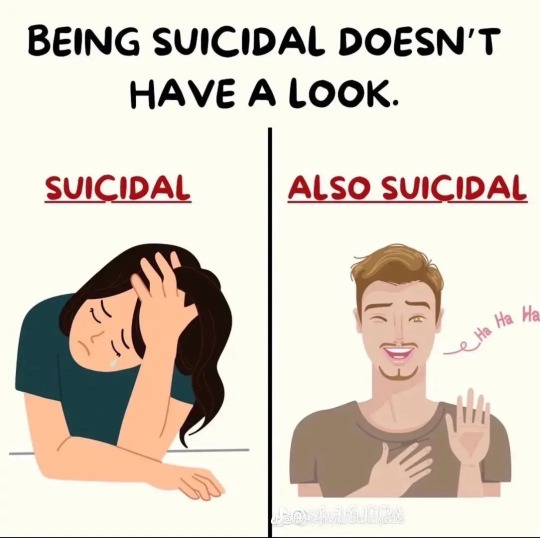
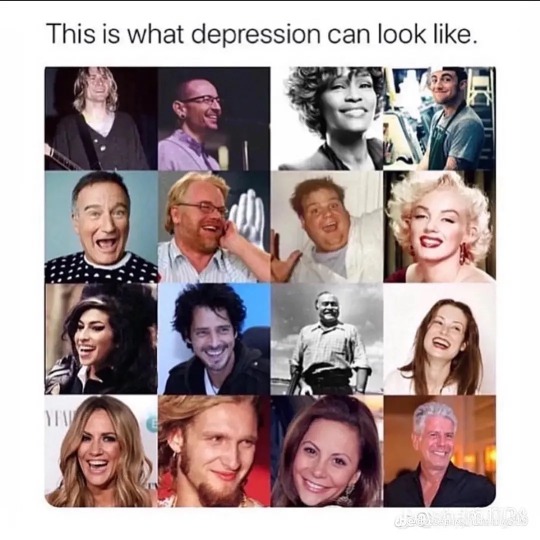



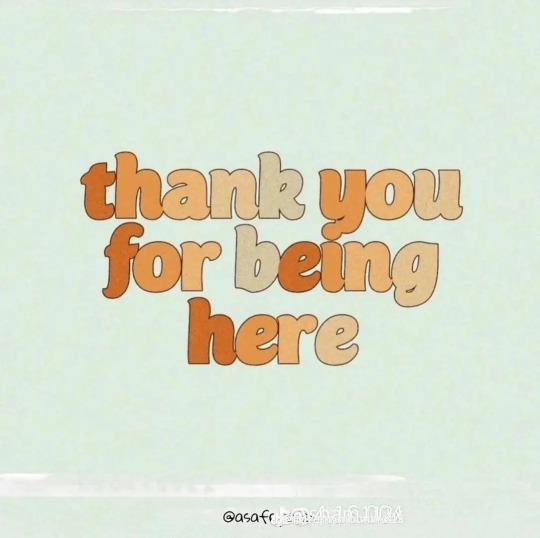
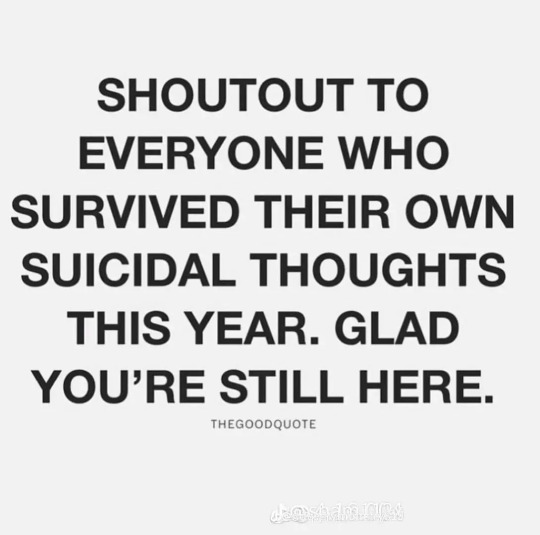
156 notes
·
View notes
Text
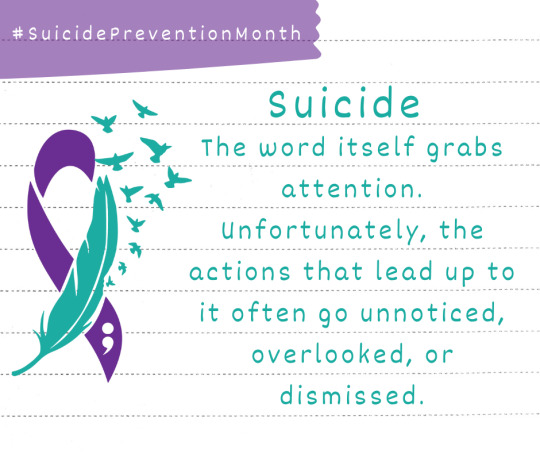
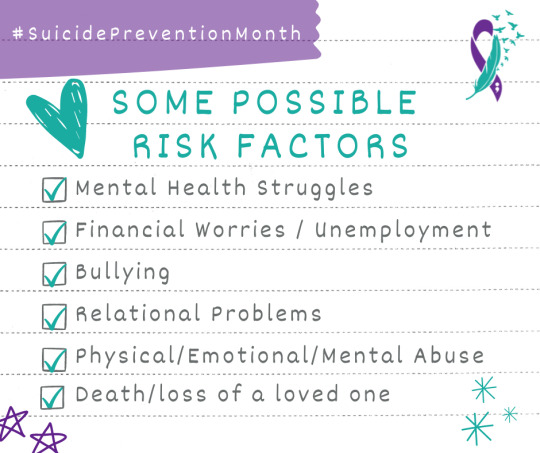
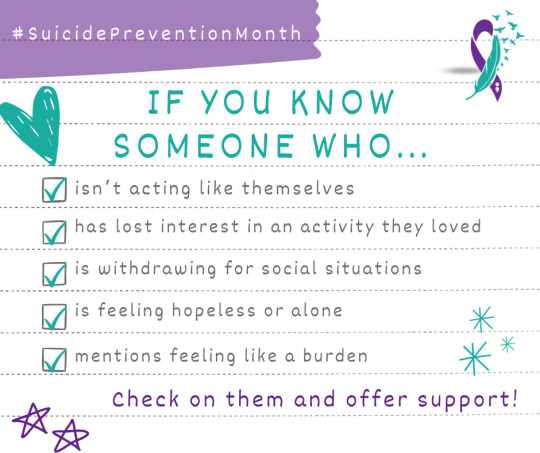
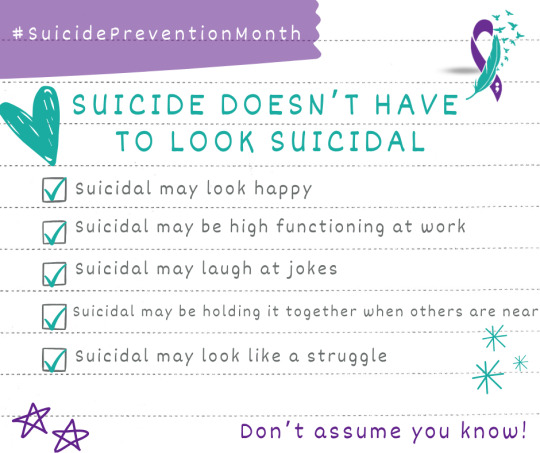
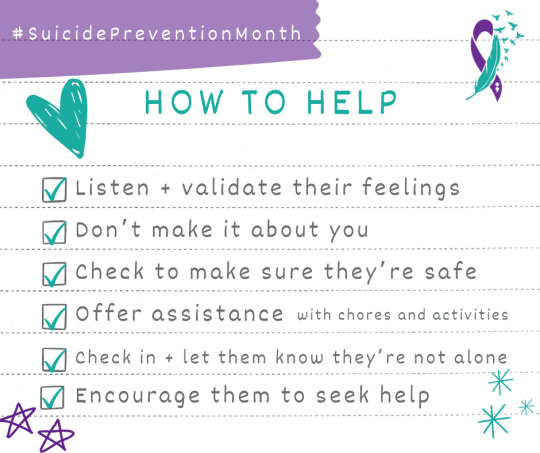
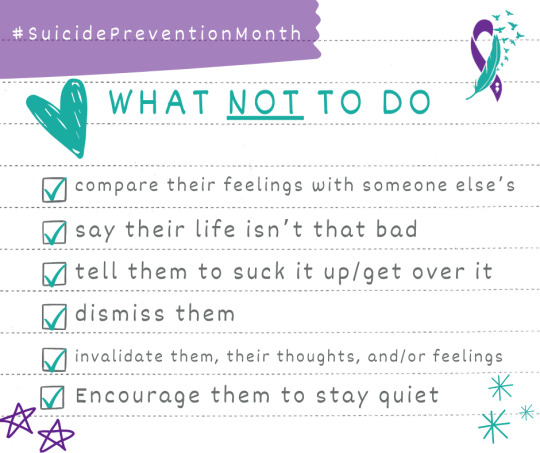
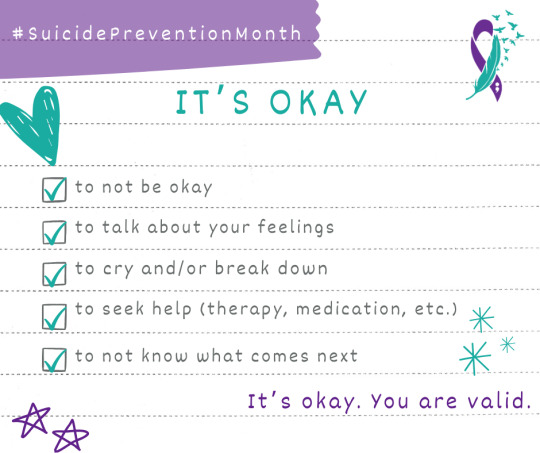
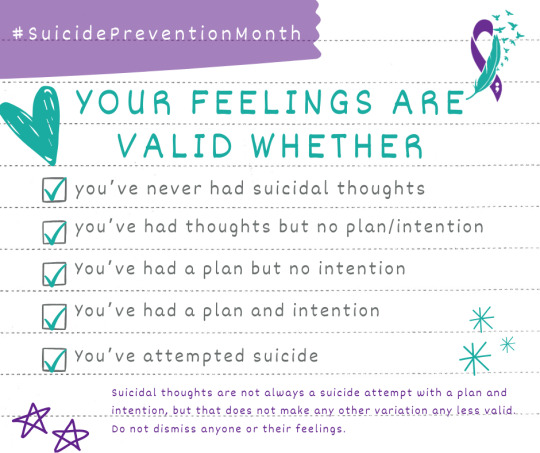

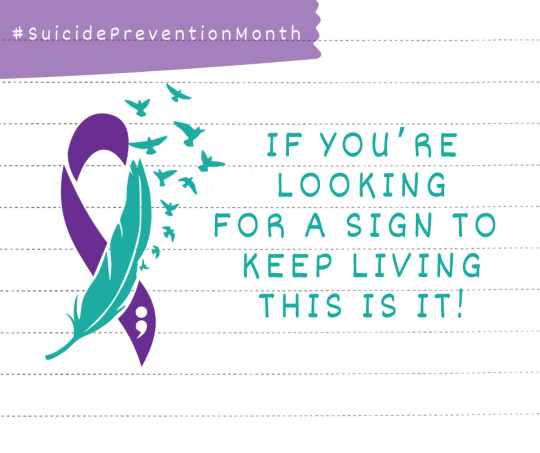
September is Suicide Prevention Month
Suicide is the most preventable form of death and yet the number of suicide victims rises each year despite increased awareness.
Why is that?
I can't answer it for everyone, but from what I've seen in my life, although people are aware, they don't understand.
I am a suicide surviver. Although I have not attempted suicide in over a decade, the thoughts linger from time to time. Sometimes it's just an intrusive thought that I can let go of. Sometimes it's a lot more and it is a lot more dangerous, but I am trying every day and that is all I can ask of anyone.
I am grateful to have found support here/online. However, people in my own life continue to belittle and invalidate my feelings. That makes me feel isolated, alone, and like there's something wrong with me. It makes me feel like I have no value.
I imagine it's hard to understand what goes through a person's head when they're suicidal if you've never felt that way. It's hard to validate someone's emotions when you (as an outsider) can rationalize them. But the problem with that is, those people don't know and they can't understand how those thoughts actually feel.
I am a very logical and rational person most of the time. However, when my depression is bad, I can't think rationally. The dark thoughts are consuming and I believe them. I know it's the depression talking. I know it's my anxiety talking. I know it's the past trauma I suffered haunting me. And yet, I still can't control those thoughts.
Those people who have never felt that way, think that rationalizing things, sharing comparing stories, or reminding you your life is good will help, but it doesn't. Not in those moments. That's what people who don't suffer have to understand.
I can try to explain that. I can raise awareness. I can shout from the rooftops trying to get people to understand. But the fact is, I can't make anyone change their thinking if they don't want to.
Suicide is a tragedy.
However, being suicidal is seen an inconvenience or a a way of "seeking attention." It is dismissed.
The same people who will cry over a friend's suicide, and wonder how they didn't see it are the same people who will tell the next person to "get over it", "your life's not that bad", "when I was in your situation..." They either don't see it or they don't care enough and that is the problem.
Suicide is preventable, but not without support. Support requires people that are not suicidal to better educate themselves beyond awareness to understanding and how to help.
You would never tell a cancer patient they're being dramatic and looking for attention when they share their struggles. You would never tell someone having a heart attack to "get over it." You would never belittle a mother who suffered a miscarriage by comparing them to someone else.
So why do that to someone suffering with mental health struggles?
Yes, there the stigma surrounding mental health and medication is improving, but we have a long way to go. That starts today and every day after.
Raising awareness is fine, but raising understanding is necessary meaningful change.

#suicide#tw:suicide#suicide awareness#suicide prevention#suicide prevention month#suicide awareness month#mental health#mental health matters#self care#lovealexhunt#about#get help#mental health support
208 notes
·
View notes
Text
Since it's Suicide Prevention Awareness Month, I just want to say this one thing: when someone trusts you enough to confide in you about feeling suicidal, what you should absolutely not do is call the authorities on them.
114 notes
·
View notes
Text
Is it still suicide awareness month?
Frankly I still don't approve of the "throw them in the hospital against their will" approach to suicide prevention.
Because one time I opened up about my intrusive thoughts because they were really scaring me.
For context intrusive thoughts are associated with anxiety and OCD and are ALWAYS things you do not want to do so they're ALWAYS very upsetting, traumatizing, or triggering.
Anyways I opened up to someone about my intrusive thoughts because they were scaring me, but I didn't know what intrusive thoughts were at the time. And I almost got a sweet new pair of grippy socks out of it.
I had to be like "I HAVE THOUGHTS OF HURTING MYSELF BUT I DO NOT WANT TO HURT MYSELF. THAT'S WHY I'M SO UPSET ABOUT IT." They actually did not help me at all but at least I did not have to be hospitalized over it so that's good.
-fae
83 notes
·
View notes
Photo
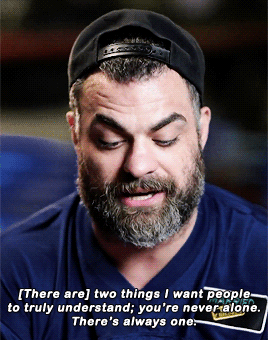
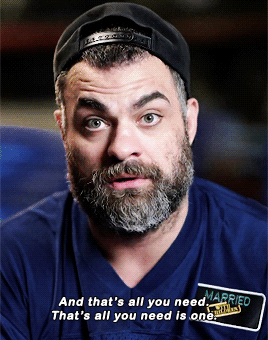
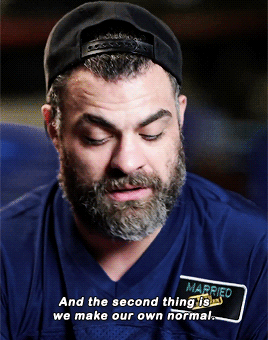
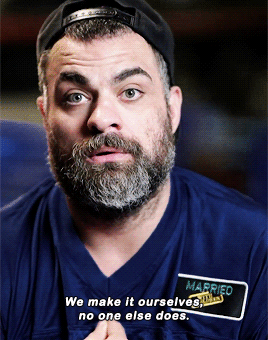
“I hope everyone understands this: you are never alone. You’re not. I’m telling you the god’s honest truth: you're never alone. There's always one person. (...) There’s always someone out there that you are going to effect when you decide to take your own life and... I don’t know. I just don’t want people doing it no more. You know, I don't want — “normal,” “normal” is another thing. Get that word out of your head. There’s no such thing as normal. That word’s a lie. My normal is not yours.”
Eddie Kingston speaks about Suicide Prevention Month
#eddie kingston#mental health awareness#suicide prevention month#wrestlingedit#aewedit#all elite wrestling#aew#tw: suicide mention#tw: mental health#*#ours: gifs#maker: s
350 notes
·
View notes
Text
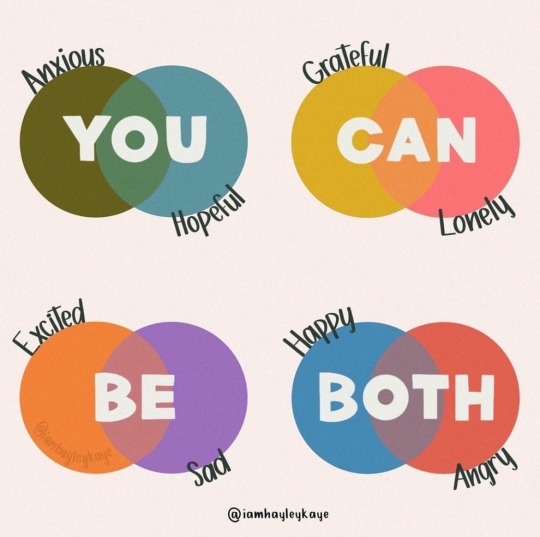
Via NAMI on Facebook.
#anxiety#depression#bipolar#panic#ptsd#mental health#mental illness#mental health awareness#hope#recovery#jesus loves you#i love you#you can do this#don't give up#you got this#i believe in you#suicide prevention#Christian#christian blog
550 notes
·
View notes
Text
cw suicide mention & imagery
original play idea where people seem to live their normal lives but the audience gets the feeling that something’s wrong, there’s a tension and there are things that obviously go unsaid that hang in the air between the characters uncomfortably long enough until the last member of the audience has filled in the blanks in their own way.
there is a figure off to the side, a very young man in a suit, watching them, unmoving and silent, and as the scenes and progress, as characters leave and appear, as the setting changes, the young man is always there. no one interacts with him, but there are moments when they almost do. when the characters stop what they’re doing when they stand close to him, and appear to listen. but there’s nothing.
the sound of TV news reports, all playing over each other, create an uncanny and uncomfortable buzzing that never, never stops, and there are too many to really make out the words. they get more silent the closer they get to the young man in the suit, quieting down to nothing when they stand by him to listen — but the characters seem unaware of the change. so does the young man, statuesque though he is.
then there’s a little girl, covered in dirt, her hair askew, her cheeks rosy — the image of having spent the day outside, playing in the dirt, a smile on her face, her eyes big, as she skips towards the young man and asks, “can we go now? can we play?”
the young man cards his hands through her hair and says, “you go ahead, i’ll be right there.”
but still he stays there, seated.
everything continues as before, but the characters slowly undergo a complete change in character, in routine, in appearance. the old man who wore suits is not dressed in sweats and old, worn out, dirty shirts. the sweet, kindhearted young adult is now quiet and apathetic. the woman who, in the beginning, was talking her friend’s ear off and could barely stand still is unmoving now, staring out into nothingness.
the buzzing and bustling background noise is slowly, gradually getting louder as the characters become increasingly nonverbal and unmoving. the lights dim down.
then all at once, after a crescendo, the noise stops suddenly, the lights turn off completely, before, with warm, yellow light, a woman we’ve seen before — as she stares into nothingness — appears on the stage, slowly approaching the young man as if unsure of her body but undeniable in her grace.
they smile at each other for a moment.
m, whispering: you’re not supposed to be here, not yet
w, cradling his cheeks: i was always supposed to be here long, long before you
m: i know. i’m sorry, i—
w: i know. i forgive you. i’ve always forgiven you
m, after a while: but not yourself
the woman shakes her head.
w: a mother will never forgive herself for burying her child, and a father will forgive himself even less. (a beat) you have such a handsome face.
m: it’s not your fault
w: so beautiful, those eyes, i’ve missed you so much
m: listen to me, it’s not your fault!
w: and your hair! papa would be so glad to know that—
m: mother. mama. listen to me. it’s not your fault
w, tearful and whispering: you were supposed to be fine. you were always supposed to be fine. it was never supposed to be this bad, we were supposed to help, but—
m: i know. i tried, i really did. both times
in that moment, the little girl comes skipping on stage again, approaching them with her wagging ponytail.
g: what are you doing here, mama? will you play with me now? it’s been so long!
the woman gasps, her tears getting the better of her as she falls to her knees and pulls the girl to her chest, who readily returns the hug
w, sobbing, kissing her cheek: hi, baby. yes, i’ll play with you, of course i will. let’s go.
the young man helps his mother up, allowing her to pull him into a hug, and she whispers: “as much as i love her with all my heart, i’m so proud of the young man you’ve grown into. and now i have you both, just as i always did.”
the young man brushes a kiss to her cheek, then lets her go, watching as his mother disappears with the little girl.
m: i have to stay a while. i’ll follow you soon.
(woman and girl, hand in hand, exeunt)
the lights dim, and the buzzing returns, accompanied by the sound of dragging footsteps the audience cannot see, until everything’s back in total darkness. the noise stays. growing louder in increments, leaving the audience uncomfortable and unsure if this was it.
as they quiet down, we hear a man, sobbing uncontrollably, before eerie silence takes his place, too.
the curtain falls.
#idk what this is but it’s deeply fucked up suicide awareness#obviously there are no dialogues except for that one half assed thing but the dialogues and the imagery and the stage setup and directions#will allude to the fact that the young man who killed himself remains uncomfortably in the lives and the minds of those who miss him#and he cannot leave because he chose this. he’s anchored to them more than he was when he was alive#maybe he’ll have a soliloquy or two. or maybe the empathetic character will speak for him in ways that we do when people die#in the ways that we put words in their mouth and turn them into people they might not have been because grief is funny like that#the static buzzing news caster noise is obviously 1) the 21st c at large; 2) grief preventing you from feeling calm; and 3) doom news#there will be quotes like ‘your death it won’t happen to you. it happens to your family and your friends’#yes the young man is trans. no that’s not why he killed himself. yes the mother takes the blame bc that’s what mothers will do#it’s all just fucked up what can i say. there are no redeeming qualities#suidice cw#cw suicide#it’s 2am i have nothing to say in my defense#i was overcome with the urge to write a play and the ideas for it sorry#not st
43 notes
·
View notes
Text
Just found out about a death in the DDLC community, so I may need to skip today’s Inktober :(
Suicide always impacts me a lot regardless of who it is, since I have a lot of history around suicidal friends, as well as depression myself. On top of this, a close family member passed away this week, which I’ve been trying to process.
In lieu of an artwork today, unless I suddenly gain the motivation to later on, I’d just like to post some links to remind folks that there are resources out there if you’re having a hard time.
You never know what’s going on in somebody’s life, so please try your best to have empathy with people.
Edit: if I do end up making art today, it’ll be MC/Sayori art. That was her favourite ship, and during her last days people were harassing her for it.
If none of these helplines prove valuable to you, talk to a friend. Seriously. Even the most optimistic people are often surprised by how many people care about them.
#ddlc fandom#ddlc#doki doki literature club#suicide awareness#suicide prevention#inktober#inktober 2023
27 notes
·
View notes
Text
No darkness can dim
The brighter light
Of a new day
.
.
.
Don't give up
#my writing#poetry#poem#suicide survivor#suicide prevention#inspiration#inspirational#stay alive#dont give up#depression#mental health awareness#creative writing#spilled ink#poets on tumblr#writers on tumblr#writers and poets#quick write
13 notes
·
View notes
Text
september is suicide prevention month. this is my message to parents.
believe your children when they tell you they’re feeling suicidal. believe them every single time. even if they tell you every single day. even if they seem happy. even if you think they have no reason to be depressed. even if they’ve never shown signs of depression before. even if they have a history of lying for attention. believe them every time.
when it comes to children (or adults for that matter) self-reporting suicidal ideation it does not matter if they are lying. repeat after me - it does not matter.
if you disbelieve them and they’re telling the truth you could end up with a dead child. if you disbelieve them and they’re lying, all you’ve done is shown yourself to be a parent who is not safe to go to in the event your child actually experiences ideation, because they will not be believed. you’ve shown yourself to be a parent who trusts their child so little that they’ll even question something as heavy as suicidal ideation.
most of the time if a person feels the need to lie about something as serious as suicidal ideation, it points to something very wrong under the surface. feeling un-cared for, being bullied, undiagnosed mental disorders etc. are all potential reasons why someone would lie about feeling suicidal. sometimes it’s easier to say “i want to die” than it is to say “i feel like you don’t care about me”. that doesn’t mean you should ever, ever express disbelief.
knowing your parent doesn’t believe you when you say you’re suicidal is agonizing, especially to a young person. there is nothing about disbelieving your child that speaks to you caring about their mental health and wellbeing. it is extremely destructive and neglectful at best.
to be vulnerable for a moment - in my own experience, my ideation being disbelieved shattered every ounce of trust i had in my parents. it destroyed my self-esteem. i came to the conclusion that i was never loved in the first place, and therefore i must be inherently unlovable. it convinced me that i didn’t deserve to live, because my own parents didn’t seem to value my life.
believe your kids.
#corvidforest#suicide awareness month#suicide prevention month#mental heath awareness#tw neglect#suicide#suicidal ideation#suicide awareness#tw sui#tw sui ideation#parenting
27 notes
·
View notes
Text
September is suicide prevention month.
I’m happy to say i’m still here, after multiple attempts. My story however is long so I’m not getting into that,,
If you are struggling, you are not alone, even if you may think you are. If you have friends who are struggling or you may think they’re struggling, please be there. Be there for them. Talk with them, about literally anything. Listen to them. You could save their life. Check on the ones you love, please.
September is suicide prevention month, and if you are still here, I’m beyond proud of you.
#strangleetomz#suicide prevention#suicide prevention month#mental heath awareness#mental health matters#suicide awareness#mental health
152 notes
·
View notes
Text
"Understanding autistic burnout"
Definition of autistic burnout
Autistic burnout is a syndrome conceptualised as resulting from chronic life stress and a mismatch of expectations and abilities without adequate supports. It is characterised by pervasive, long-term (typically 3+ months) exhaustion, loss of function, and reduced tolerance to stimulus.
Characteristics and impact
The research participants describe the experience of autistic burnout as chronic exhaustion, loss of skills, and reduced tolerance to stimulus. They described it as affecting every part of their lives and lasting for long periods of time. Many first experienced autistic burnout during puberty, graduation from secondary education, or at other times of transition and changes in developmental expectations.
Autistic burnout had many negative effects on their lives. Many highlighted difficulties with their health, especially their mental health. They talked about struggling with independent living, loss of self-belief, and being frightened that the loss of skills from the autistic burnout might be permanent. They also talked about a lack of empathy from neurotypical people, who had difficulty understanding or relating to the autistic person’s experiences. Some people related an increase in suicidal ideation and suicidal behaviour.
Reasons why autistic burnout might occur
People described a collection of life stressors.
Masking their autistic traits, for example by suppressing autistic behaviours, pretending to be non-autistic, or working very hard to act in a non-autistic way.
Difficult or unreachable expectations from family, school, work, or society in general.
Stress from living in a world not set up to accommodate autistic people, for example managing the stress of having to be in noisy environments.
Life-changes and transitions that are stressful for anyone, for example transitioning from school to work, experiencing a mental health crisis, or the death of someone close.
They also described barriers to getting support or relief from the stress.
Gaslighting or dismissal when attempting to describe the autistic burnout, for example being told that everyone has these experiences, that they just need to try harder, or that they are making it up.
Poor boundaries or self-advocacy with respect to saying no, taking a break, or asking for help. This may be due to trauma, fear, lack of assistance in learning how, and a history of negative responses from others when they tried.
Inability to take a break from stress that is so pervasive (“How do you take a break from life?”).
Insufficient external resources and supports, for example inadequate disability services, lack of useful social support.
Together, the life stressors contributed to a cumulative load of stress and the barriers to support meant they were unable to get relief from the stress. At some point, the expectations on the person far exceeded anything they were able to do. Every part of them gave up and autistic burnout resulted. Or, as one study participant summarised:
‘‘Autistic burnout is a state of physical and mental fatigue, heightened stress, and diminished capacity to manage life skills, sensory input, and/or social interactions, which comes from years of being severely overtaxed by the strain of trying to live up to demands that are out of sync with our needs.’’
Reducing or Preventing Autistic Burnout
Participants told us about ways that they found to relieve or prevent their autistic burnout, and advice they have for others.
Acceptance and support – interacting with others who could accept them for who they were, without any need to masking or pretend. This could be one-on-one with family members or friends; on a community level of groups with accepting cultures; or on a peer level, especially finding other autistic people who could validate their experiences and offer information and emotional/social support from lived experience.
Being autistic – attending to autistic needs like stimming and spending time with intense interests and comfort items, unmasking, using autistic strengths or doing things in an autistic way.
Formal supports – receiving reasonable adjustments at school or work, physical support like someone to provide groceries, and mental health support.
Reduced load – taking time off, more breaks, reducing social activity or other types of more stressful activities.
Self-advocacy and health – learning how to set healthy boundaries and expectations from others, and what to do when others aren’t respecting boundaries. Learning how to ask for help in a way others might be responsive to, and leading as healthy a lifestyle as possible (for example participants described how exercising, sleeping, eating well, and doing things that made them happy helped them out of autistic burnout once they had enough energy to do them).
Self-knowledge – learning how to recognise and act on the early signs of autistic burnout (for example by cancelling social plans to have more rest), having an autism diagnosis, and understanding one’s own patterns of behaviour and feelings.
Recommendations and next steps
We recommend increasing awareness about autistic burnout, and connecting with the autistic community and peers that understand autistic burnout. The experiences of people who describe being in a state of autistic burnout should be validated, whether they use the term or not. We recommend that therapists and clinicians learn to recognise autistic burnout in clients and offer strategies for relief.
In general, we recommend others be aware of the potential dangers of teaching autistic people to mask or suppress their autistic traits. Suicide prevention programs may want to consider the potential role of burnout. We strongly support interventions to decrease the discrimination and stigma associated with autism and disability in society, and to improve access to reasonable adjustments and acceptance.
Though an important start to the conversation, our findings are from a small qualitative study of a non-random sample. They are also limited to autism; we feel that this may be a broader experience of people who experience disability. Therefore we highly recommend more research in this new and urgent area, especially in collaboration with autistic people who can contribute the expertise of their lived experience.
--Dr. Dora Raymaker, Research Assistant Professor at Portland State University, based on research by Academic Autism Spectrum Partnership in Research and Education (AASPIRE) (via National Autistic Society)
#autism#actually autistic#autistic burnout#late diagnosed autism#late diagnosed autistic women#autistic women#autistic adult#burnout#coping#compassion#destigmatization#mental health#therapy#therapist#mental health awareness#undiagnosed autism#undiagnosed autistic#neurodiverse#neurodivergent#neurodiversity#neurodiverse stuff#actually neurodiverse#its the neurodivergency#recovery#tw sui ideation#tw: suicide mention#suicide prevention#late diagnosed autistic men
9 notes
·
View notes
Text
You are strong, enough and important.
Today, September 10, is suicide prevention day, remember that raising awareness of this is the same as preventing it, thank you for being here, thank you for being so strong, remember that it is not bad to not be well.

Remember that listening to someone can change their day and life.
#suicide prevention day#10 of september#10 de septiembre#dia de prevencion del suicidio#you are enough#make aware#art#you are no alone#its ok to not be ok#I love you :)
20 notes
·
View notes